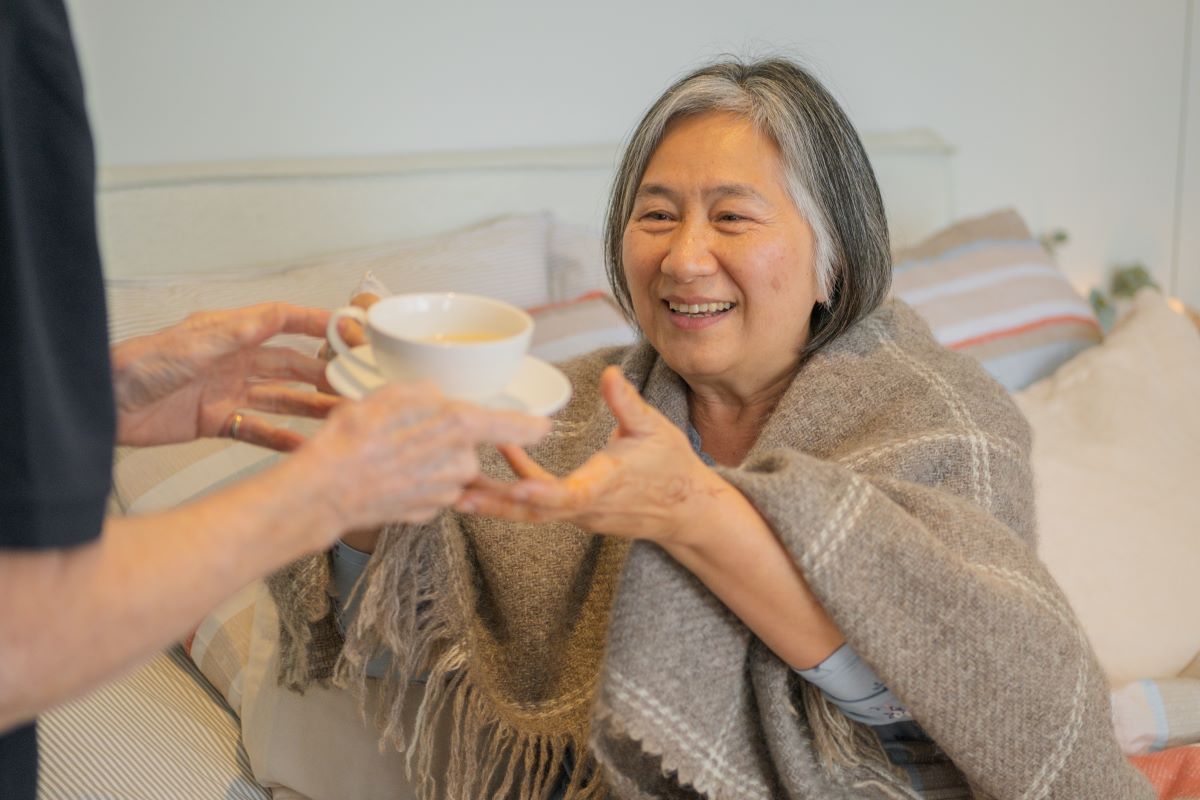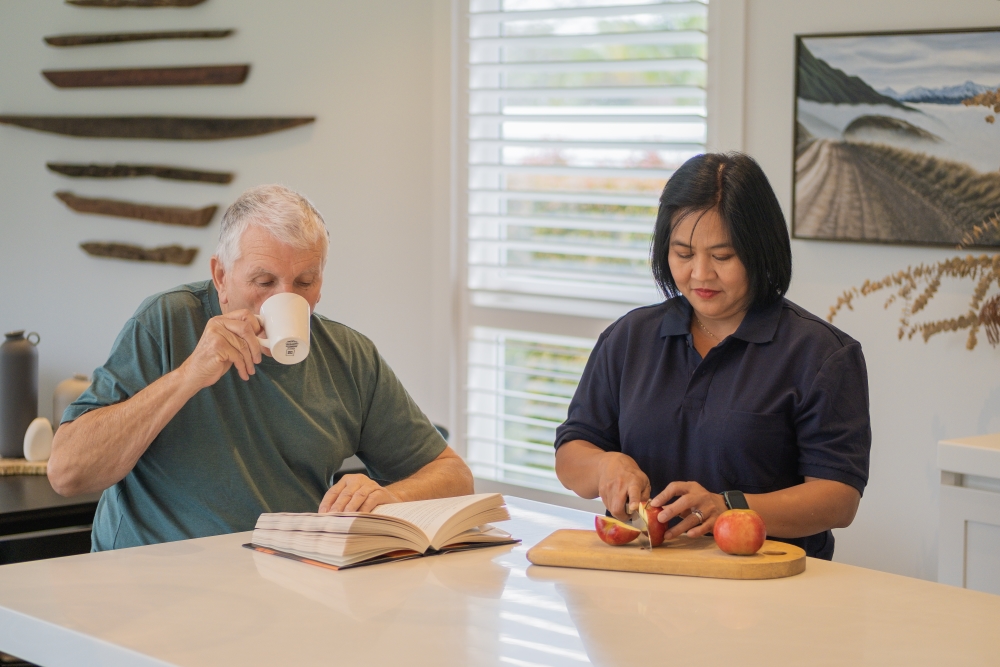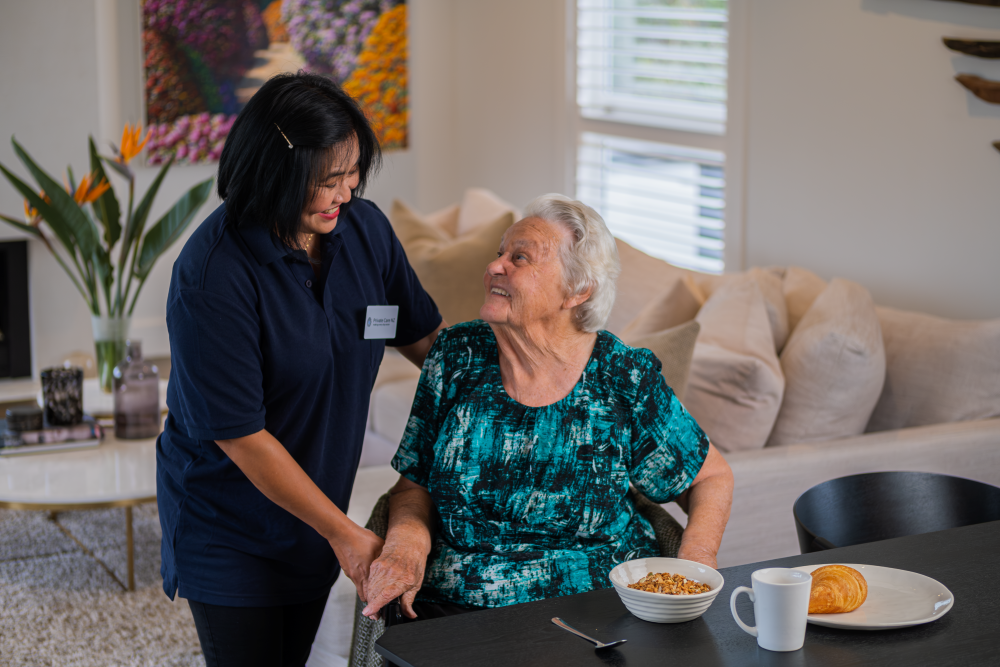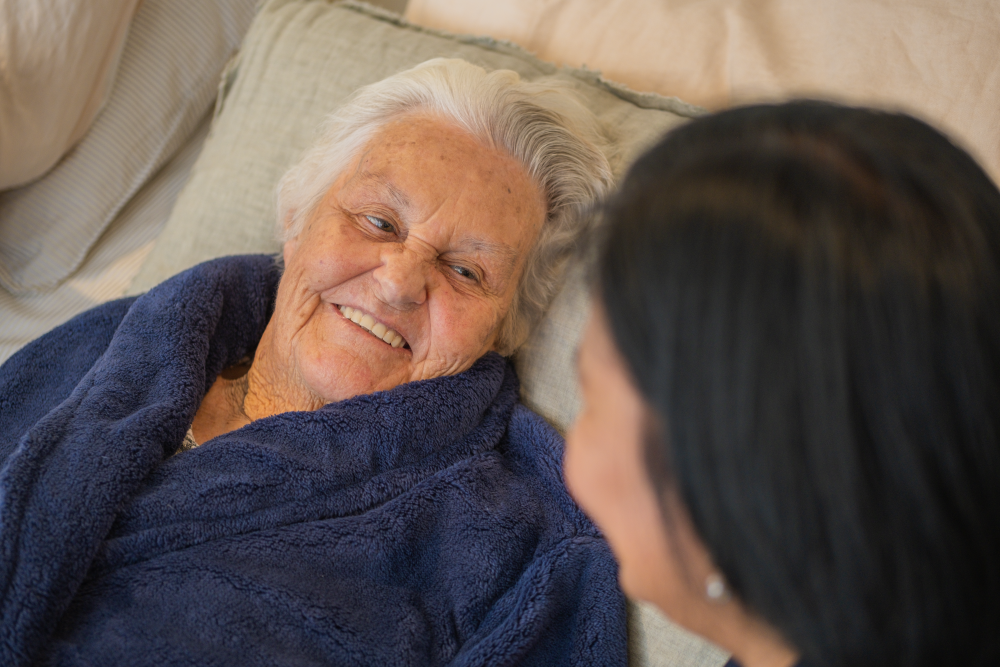
We’re committed to improving quality of life with our services for dementia patients. Compassionate and bespoke at-home care allows individuals at various stages of the condition to live as independently as possible in the surroundings that are familiar to them.
Our dementia care services are available throughout the country, offering support and quality of life to a large number of New Zealanders with the condition. With rates of dementia close to 4% in the 60+ population and 14-15% in the 80+ population according to one study published in 2022, the need is great, and growing. Our skilled and experienced team of care professionals are an invaluable resource for dementia patients and their friends and family members.
Private Care NZ offers tailored dementia care to suit the unique needs of every patient. Get in touch today.

Signs dementia care is needed
Whānau around New Zealand are putting in the work to take care of their own. However, there often comes a point when professional help is required for a person with dementia to continue to live a safe and independent life. Late-stage dementia care presents many challenges, but how do you determine when it’s time to call in a little extra help?
If you’re providing dementia or elderly care for a loved one, these are the signs to look out for that may indicate professional care would be a helpful supplement.
Early signs that dementia care is needed include:
- Increasing memory loss and confusion. A person with dementia will likely experience rising levels of memory loss and confusion. As it becomes more acute and affects daily tasks, outsourced help may become necessary.
- Noticeable mood changes. Uncharacteristic aggression, melancholy, and other changes in mood can indicate that the condition is progressing and late-stage dementia care may be required.
Advanced signs that dementia care is needed include:
- Carers experiencing safety concerns. If your loved one with dementia is displaying concerning behaviour like forgetting to turn off a stove or leaving their house and getting lost, more supervision is likely required.
- A decrease in personal hygiene. If a normally clean and tidy person with dementia is beginning to let these things slide, this is an indication that they are less able to care for themselves and require more intensive support.
As a loved one caring for a person with dementia, your physical and mental health matter too: don’t forget to reach out when help is needed.
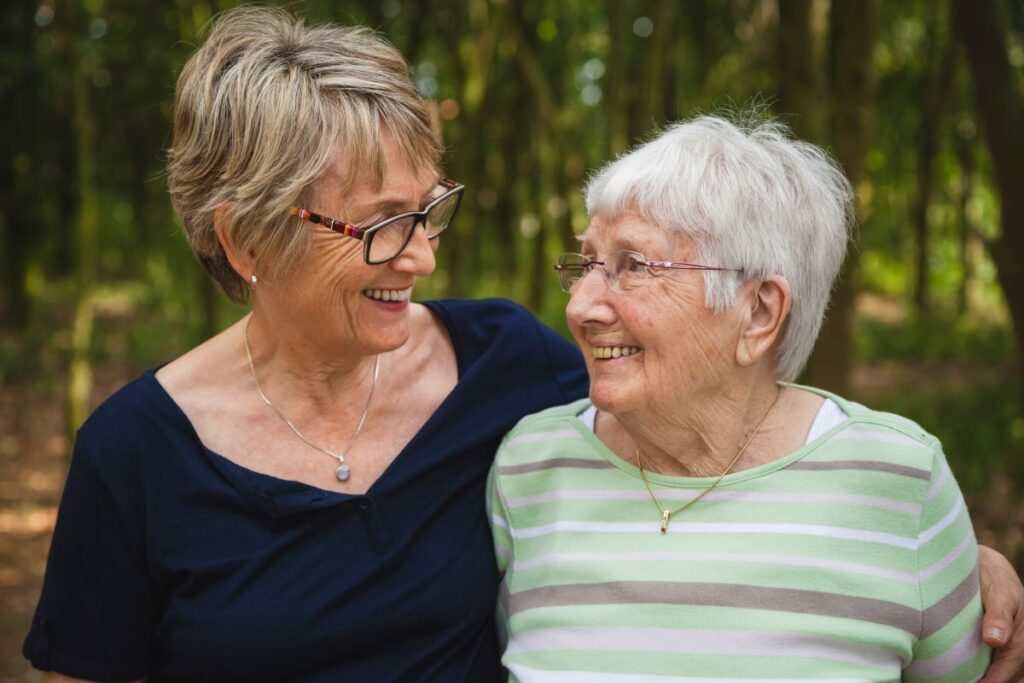
Understanding dementia stages
Dementia is not a single disease, but an umbrella condition that covers a wide range of illnesses with similar presentation and symptoms. It is progressive, and although the progression of dementia looks different in every individual it can be tracked in three general stages: early, mid, and late.
Understanding dementia stages is important when it comes to determining the need for various types of care and support. Here is a breakdown of what each stage might look like:
Early stage dementia
In its early stages, dementia might include symptoms such as mild memory loss and subtle changes in personality or mood. This stage can look like simple ageing in some cases, and may only be noticeable to those close to the dementia sufferer. A person with early dementia is likely to be able to live independently with little help.
Mid stage dementia
At this stage, symptoms may become more pronounced and begin to affect daily tasks and relationships. Cognitive decline can become apparent, with the person becoming confused and disoriented. This is when they may begin to display behaviours that their loved ones struggle to recognise.
Late stage dementia
At this point in the progression of the condition, patients will experience severe cognitive decline, with significant memory loss. They may not remember close family members’ names or faces. It can also have physical symptoms, affecting a person’s ability to speak, eat, and swallow. Bladder and bowel control may also be lost.
Late-stage dementia care in particular is often very demanding, but professional help may be required at any stage. There is support available at every stage necessary.

Choosing when to begin dementia care
Choosing dementia care can be a sensitive decision for families. It is often difficult to know when to seek care, what type of care is required, and how it might work.
These are some of the important considerations that are likely to come into play when discussing dementia care at home:
Emotional factors
Entrusting the care of a loved one with dementia into the hands of others is not a decision taken lightly for many family members. We understand this completely: that’s why we are more than happy to answer any questions you may have during the consultation and assessment process. We also carefully match carers to patients, and encourage interaction and collaboration with friends and family to ensure that all involved are happy with the services being provided.
Practical factors
Each patient has unique needs, which makes choosing quality dementia care crucial. Will your provider understand what is needed? What will that look like in practice? The Private Care NZ team has a thorough assessment process which allows all interested parties to contribute to a plan that takes into account all practical concerns and details.
Financial factors
The cost of dementia care is always a consideration. During the consultation and assessment process, Private Care New Zealand offers a clear picture of the cost of necessary care and can offer ideas as to how other patients and their families have funded care in the past. We also have popular and affordable package options that may be suitable.
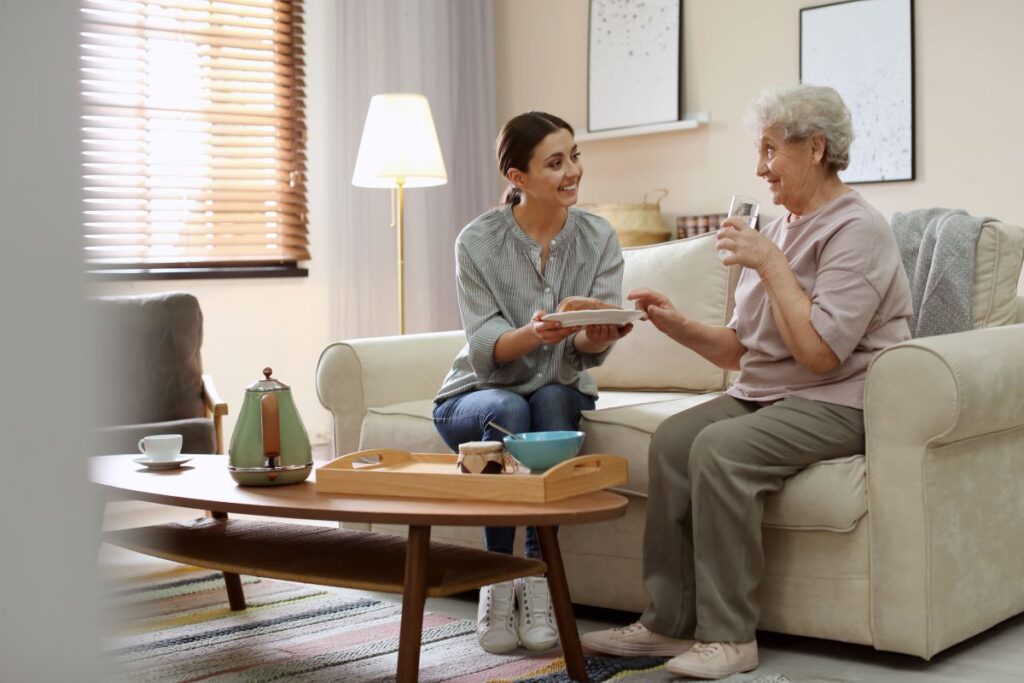
Benefits of dementia care services
Receiving professional, compassionate care is of huge benefit to a dementia patient and their family. The right support can improve quality of life, increase independence, and reduce stress for both the patient and those around them.
Emotional support
Taking care of a loved one with dementia is both an honour and a heavy weight to carry for many friends and family members. Easing that weight on the shoulders of friends and family members is one of the best things we are able to do for our patients. Additionally, our social and companionship services offer fantastic emotional support to patients, helping them to maintain a sense of normalcy and access to their community.
Physical health
With medication management, wound care, and our range of certified caregivers, we can support dementia patients to improve and maintain their physical health alongside offering emotional and practical help.
Practical benefits
The logistics of providing care for dementia patients, particularly in the later stages of the condition, can be tricky for friends and family members with jobs, children, and other responsibilities. Our carers can work around schedules and fill in the gaps where required, providing seamless, tailored support that takes care of those practical details.
Dementia services should make life better for those suffering the condition and take some of the weight from their loved ones providing care. That’s what Private Care NZ’s holistic services are here for: reach out to us to learn more today.

Dementia care services offered by Private Care NZ
Private Care NZ offers an array of services for dementia patients, creating tailored packages that provide individuals with the unique support they need. “Making every day easier” is part of our mission statement; we take that seriously.
Quality dementia care at home caters to many different needs. Our many years of experience and the deep pool of skills we can draw on allows us to work alongside loved ones to determine what’s needed and how best to make that happen.
At-home services for dementia patients
Caring for dementia patients in their home is a large part of our service offering, and something that our team is well equipped to do. Carers can help with daily tasks, aiding patients in retaining their dependence as long as possible, and provide personal care, social support, companionship, medication management, and more. We can even provide specialised in-home care for those with late-stage dementia.
Additional services for dementia patients
As part of our personalised care plans, the Private Care NZ team can provide:
- Respite care to support other caregivers, allowing time for holidays and breaks to prevent burnout.
- 24-hour services to offer caregiver support whenever needed.
- Palliative care.
- Connections through partnerships with leading New Zealand organisations like Freedom Medical Alarms, My Food Bag, Uber Health, U-Plan, Heartland Bank, and many more. These partnerships make it easier for the people we support to access add-on services like,
- Medical alarms
- Meal delivery
- Specialist health equipment
- Transportation support
These dementia home care services can be mixed and matched to create a package tailored to each individual. Getting in touch is the first step: from there, our consultants will contact you to discuss the kind of help your loved one with dementia will benefit from. We’ll work alongside you to put together the ideal package. Then the onboarding process begins and we will match the patient with the carers who will be the best fit for them.

FAQs
The progression of the condition is largely indicated by the appearance and worsening of symptoms. As it progresses, patients can experience:
Increasing memory loss, forgetting names and faces even of friends and family members.
Confusion and mood changes.
Reduced competency when it comes to daily tasks including personal hygiene.
Physical decline including loss of bowel and bladder control.
As a patient’s condition deteriorates, it may be necessary to seek late-stage dementia care.
Each case is unique, but dementia typically progresses over five years or more. However, there is no set timeline, and different types of dementia (Alzheimer’s, vascular dementia, etc) can progress faster or slower.
Individual dementia patients have a variety of different support needs, depending on their symptoms and situation. That’s why Private Care NZ offers a wide range of dementia care services. These cover the most common needs: personal care, home help, medication management, companionship, social support, respite and sleepover care, palliative care, and more.
Often, late-stage dementia patients require the care that a facility can best provide. However, with the right support, it’s often possible for a dementia patient to stay safely in their own home for much longer than they would be able to otherwise. Services like home help and personal care make it possible to retain independence.
Unfortunately, there is currently no cure for any kind of dementia. There are medications available that can help to treat and reduce symptoms to some degree in some patients.

Get care today
If your loved one is in need of quality, professional dementia care, Private Care NZ can help. Our range of services can help patients to retain independence and remain in their own home as long as possible, with safety and overall wellbeing our top priority.
Reach out to our team today: we’d love to answer your questions. With a comprehensive initial consultation and assessment process, our team will help you to make informed decisions about which services will be most helpful, and create a bespoke care plan alongside you.
Submit an enquiry or find our various contact details here – our team is ready to help with sensitive, targeted care.

